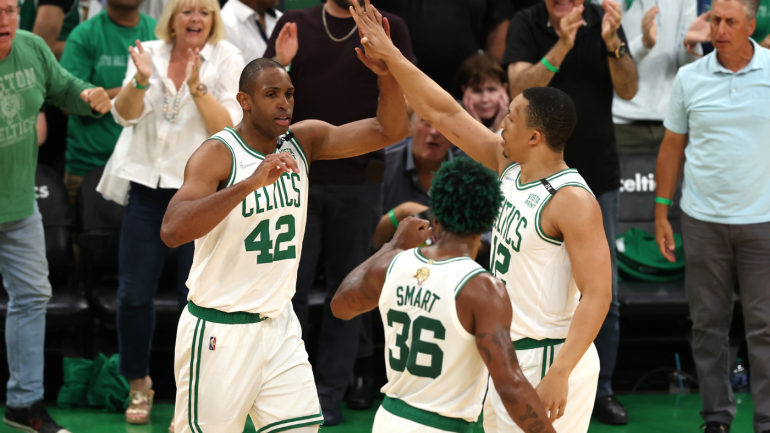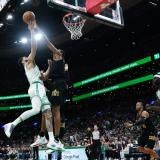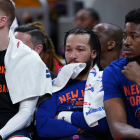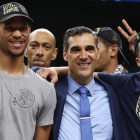
BOSTON -- Oh, how simple basketball sounds, listening to the Boston Celtics talk. They've lost seven games in the playoffs, and after each one, they've said they just need to get out of their own way. They know exactly what the opposing team is trying to do, and they simply need to be sharper: Make the right reads, take care of the ball.
On Tuesday before Game 3, coach Ime Udoka answered his trillionth question about turnovers. "Majority is over-penetrating, playing in the crowd, as I talk about quite often. Just not keeping it simple." In Game 1 of the NBA Finals, a win, the Celtics got wide-open 3s because their offense was "crisp and sharp." In Game 2, a loss, they committed 15 live-ball turnovers because it was not.
One by one, players echoed this sentiment. No self-inflicted wounds, no problems.
In Game 3 on Wednesday, Boston committed seven live-ball turnovers. And guess what happened: The Celtics won, just like they have after all of their other postseason losses. According to Jaylen Brown, who scored 17 of his team-high 27 points in the first quarter, it was all about patience.
"We want to play fast in transition," Brown said after the 116-100 victory against the Golden State Warriors. "But when we settle down in the half court, (we want to) get our spacing right, take our time and find the open guys and be ready to make plays."

CBS Sports HQ Newsletter
Your Ultimate Guide to Every Day in Sports
We bring sports news that matters to your inbox, to help you stay informed and get a winning edge.
Thanks for signing up!
Keep an eye on your inbox.
Sorry!
There was an error processing your subscription.
Numerous times, Brown and Jayson Tatum, who had 26 points and nine assists, backed out to near halfcourt in order to create a runway to the rim. When Boston's stars attacked one-on-one, they were decisive, whether that meant taking it all the way to the basket or finding an open teammate. They targeted mismatches, and, even when they attacked one of Golden State's stronger defenders, they knew help would be there early and they knew who would be open.
The Celtics had watched the film of Draymond Green's cat-and-mouse game around the rim, and they knew their reads had to be better. Udoka stressed that, unlike the Milwaukee Bucks and Miami Heat, their two previous opponents, the Warriors do not have an imposing shot-blocker around the basket. By putting pressure on the rim, Boston forced Golden State to scramble, which led to open shots and offensive rebounds. Marcus Smart bounced back from a subpar showing with a 24 points and five assists.
"It was just us being us," Smart said. "Just continuing to drive the ball and try to find a great shot for our teammates and ourselves. This Warrior team does a very good job of helping each other out on their defensive end. They're going to make you have to make the right play every single time, and if you don't, they're going to make you pay. For us, it was just getting in the paint and making the right play. We took what they gave us, and that was it."
The beauty of Boston's offense is that, when it works, it really is that simple. Tatum, Brown, and Smart are the three main playmakers, but everybody else in the playoff rotation is at least an excellent connector. Once the first domino falls, the Celtics are probably going to get a good look.
So what are we to make of the times when their offense doesn't work, when their ballhandlers get sped up and their turnovers pile up? Given they are two wins away from a championship, perhaps the proper perspective is that the sloppy stretches are a just an ordinary flaw, but not a fatal one. Maybe the only thing that matters is how Boston handles them.
Five months ago, in the huddle as a 24-point lead was evaporating at Madison Square Garden, Udoka urged the Celtics to "get our composure back" and "take care of the ball -- it's self-inflicted." In the huddle on Wednesday at TD Garden, as an 18-point lead was evaporating in Game 3 of the NBA Finals, Udoka asked the team, according to longtime Celtics scribe Steve Bulpett, "Will you stop playing like assholes?" Same thing, really.
The difference is that, this time, Boston did regain its composure. Tatum recently cited that Jan. 6 loss in New York as the low point of the season, and it has been cited many times as the turning point. The Celtics were 18-21 then, and they went 33-10 afterward, mostly because they cleaned up their act on offense. Tatum said after Game 3 that they're now at their best "when we respond to tough situations, when we respond to teams going on runs."
As frustrating as it may be to see Boston make the same mistakes over and over again, look at the bright side: It doesn't have to keep coming up with new fixes! The Celtics had their worst offensive performance of the entire season (81.8 points per 100 possessions before garbage time, per Cleaning The Glass) in Game 2, then followed it up with a dominant performance in the halfcourt, on the glass and in the paint, simply by doing what they said they needed to do.
Boston's biggest edge against the Warriors is that it has clarity. The Celtics are confident that they'll be fine as long as they keep it simple because they know they have a strength that no team can match: a whole starting lineup full of big, switchable defenders, plus a couple more off the bench. Defense has carried Boston through subpar offensive games, and it does not have to sacrifice its spacing in order to put five elite defenders on the court. There is not another team in the league that can say that.
For Golden State, things are more complicated. While everybody knows who the Celtics' best seven players are, there isn't much separation when it comes to the Warriors' role players. How the rotation looks, then, becomes a matter of what the coaching staff feels is most important at any particular moment. They can go with Gary Payton II for defense or Jordan Poole for playmaking, Kevon Looney for rebounding or Nemanja Bjelica for shooting.
"We were kind of plugging holes tonight," coach Steve Kerr said after Game 3. Other than a third-quarter stretch in which Stephen Curry got hot, "we weren't able to find that two-way combination."
Just about everybody has to search for that kind of balance in the playoffs. Not Boston. This is why, despite having responded to losses better than wins throughout these playoffs, Udoka thinks there's no anxiety heading into Game 4.
"I think we've seen what makes us successful," Udoka said.






















